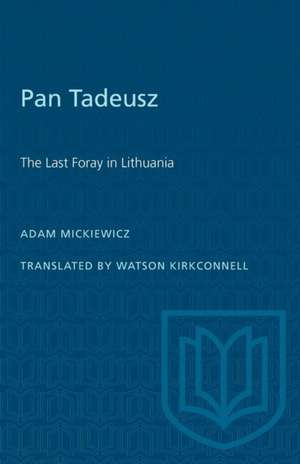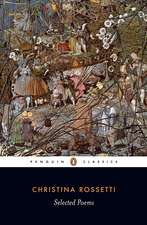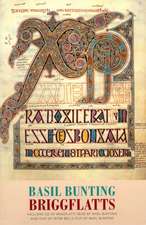Pan Tadeusz
Autor Adam Mickiewicz Traducere de Watson Kirkconnellen Limba Engleză Paperback – 15 dec 1962
| Toate formatele și edițiile | Preț | Express |
|---|---|---|
| Paperback (5) | 113.24 lei 6-8 săpt. | +27.85 lei 7-11 zile |
| Hippocrene Books – sep 1992 | 151.91 lei 3-5 săpt. | +27.85 lei 7-11 zile |
| SMK Books – 25 apr 2011 | 113.24 lei 6-8 săpt. | |
| Alpha Editions – 3 iul 2020 | 132.54 lei 6-8 săpt. | |
| Winged Hussar Publishing, LLC – 29 mar 2019 | 140.88 lei 6-8 săpt. | |
| University of Toronto Press – 15 dec 1962 | 356.52 lei 6-8 săpt. | |
| Hardback (2) | 140.23 lei 3-5 săpt. | |
| Winged Hussar Publishing – 18 iun 2019 | 140.23 lei 3-5 săpt. | |
| SMK Books – 3 apr 2018 | 233.39 lei 6-8 săpt. |
Preț: 356.52 lei
Nou
Puncte Express: 535
Preț estimativ în valută:
68.23€ • 70.39$ • 57.75£
68.23€ • 70.39$ • 57.75£
Carte tipărită la comandă
Livrare economică 04-18 martie
Preluare comenzi: 021 569.72.76
Specificații
ISBN-13: 9781487581053
ISBN-10: 148758105X
Pagini: 412
Dimensiuni: 140 x 216 x 23 mm
Greutate: 0.52 kg
Editura: University of Toronto Press
ISBN-10: 148758105X
Pagini: 412
Dimensiuni: 140 x 216 x 23 mm
Greutate: 0.52 kg
Editura: University of Toronto Press
Notă biografică
Adam Mickiewicz (1798-1855) is the national poet of Poland. He was successful in every genre at which he tried his hand, setting the benchmark for excellence in poetry, prose and drama for all the writers that came after him. His lyric poems, collected in Ballads and Romances [Ballady i romanse, 1822], ushered in the Romantic Movement in Polish literature. His Erotic and Crimean Sonnets [Sonety mi¿osne and Sonety krymskie, 1826] form one of the most accomplished cycles in that demanding form since Petrarch. His narrative poems, Konrad Wallenrod (1828) and Gräyna (1823), reveal his sustained mastery with longer poetic genres. Mickiewicz's epic in twelve cantos, Pan Tadeusz (1834), is universally recognized as Poland's national epic, as well as the last Vergilian epic written in Europe.Prose occupies a rather minor niche in Mickiewcz's corpus of writings. The quasi-Biblical Books of the Polish Nation and Polish Pilgrimage [Ksi¿gi narodu i pielgrzymstwa polskiego, 1832] put the English reader in mind of a more practicable William Blake. With their socially and politically-applied Christianity, Mickiewicz had an appreciable influence on the thought of his friend, Lammenais. Finally, his Cours de litte¿rature slave professe¿ au Colle¿ge de France, delivered during his exile in Paris, and published posthumously in 1860, is one of the first balanced and comprehensive accounts of the Slavic traditions in literature and culture to meet Western eyes.It is impossible to assess the importance of Adam Mickiewicz to the Polish consciousness. During the period of the Partitions, which lasted from 1795 until 1918, Poles looked to Mickiewicz for the guidance that political figures could not supply them. He died in exile, trying to raise troops in Turkey for the Polish independence struggles.











